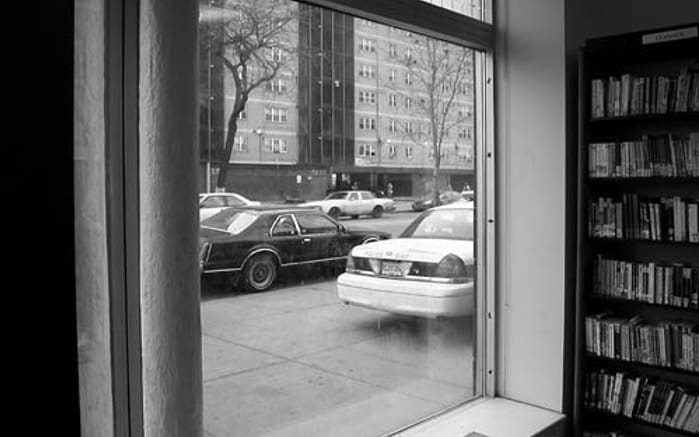Transcribed from the 10 December 2016 episode of This is Hell! Radio (Chicago) and printed with permission. Edited for space and readability. Listen to the whole interview:
The intellectual decrepitude of capitalism, if we can judge by its defenders, is almost complete. The end of work is in sight. The connection between work performed and character created or income received is absolutely unintelligible. So let’s get on with a society in which there doesn’t have to be a rigid relationship between work and income.
Chuck Mertz: Fuck work! It sucks! You don’t like it; I don’t like it. If I could still get a good day’s pay for a good day’s work, fine. But that ain’t the case anymore. The labor market and work ethic are broken.
Here to tell us how it’s broken and what that means for our future, historian James Livingston is author of No More Work: Why Full Employment Is a Bad Idea, and professor of history at Rutgers University New Brunswick. Prior to No More Work, James’ most recent book is 2013’s Pragmatism, Feminism, and Democracy: Rethinking the Politics of American History. And he was on This is Hell! back in 2011 to discuss his book The World Turned Inside Out: American Thought and Culture at the End of Twentieth Century, which is a fantastic work.
Welcome back to This is Hell!, James.
James Livingston: Hi! Thanks for having me.
CM: You start by writing, “I’ve been working my whole life. That’s probably why I wrote this book. I’m sick of it. Don’t get me wrong; I have two more works in progress, and I like to teach. Besides, my 401K needs replenishing, after the Great Recession and my ex-wife’s raids on it. Still, I wish I didn’t have to work, or want to.”
You’re sick of wanting to work? I understand being sick of having to replenish your retirement fund, but why are you sick of working at teaching (something you like to do), and working at writing (something you clearly have a passion for)?
JL: What I was trying to do there was identify myself with the psychological imperative of work, to let myself off the hook. In part because the original title of the book was, as you know, Fuck Work, and a few people said, “Well, wait a minute, aren’t you demeaning the work ethic? Aren’t you trivializing what most people feel about work?” So as an author of a book that mostly denigrates work and says it’s a sickness unto death and that it’s almost literally killing us, I wanted to say I know how it feels. I know what it feels like to want to work. But we’ve got to get over it.
One of the things that I do that might be controversial is that I both criticize and enlist Hegel, Marx, Nietzsche, and Freud in the argument to say we are living with a slave morality. That’s what the work ethic has become. We go to work, and we’re pretty diligent about it, and yet 25% of the people who are actually employed live below the poverty line. A fifth of American children live below the poverty line. Forty to fifty percent of the people who are employed in this country are eligible for food stamps. They don’t apply for them, because it’s embarrassing. But they’re eligible.
The labor market, as you pointed out, is simply broken. Although at the end of the book I say that maybe the labor market has actually been perfected, along the lines that capital always wanted.
Since I started writing the book, I keep discussing it with my students, and they’re pretty adamant about having a work ethic. Part of the argument in the book is that we need a guaranteed annual income, and that we already have the groundwork for doing that without worrying about what happens to the work ethic. But my students often say, “Wait a minute, if everybody has the same income, what if I want to start a company, or what if I have an invention, or what if I want to work really hard and make a lot of money?” And I say, “Fine! What’s the constraint?”
If we do a basic guaranteed annual income (which, by the way, is not a left or a right idea; it has an unpredictable political valence) it doesn’t stop you from working your ass off if you feel like it. It doesn’t stop you from starting a company. Let’s say we give everybody forty thousand dollars as a basic annual income. Does that stop you from killing yourself to write the Great American Novel or to start some silly-ass company that provides another app on your phone? No. It doesn’t.
The relationship between work and income is already broken. That’s one. We know how to detach income from work. That’s two. So what, then, is the point of us insisting that there is some transparent, rational, or justifiable relationship between effort and reward, work and income?
CM: In No More Work, you try to “broaden [your] indictment of the moral universe, where we must ‘earn our keep’ if we are to be true to ourselves, where meaningful work and the production of goods is somehow better for us than indolent leisure and the consumption of goods.”
Now, leisure and consumption might be better, but aren’t they impossible without work? Isn’t what little happiness we have outside of work only possible because of work? Isn’t work the cost of happiness?
JL: The simple answer is no. In part because, again, the correlation between income and work has been broken. Now we could say that that means the labor market is broken; people are not getting paid what they’re worth—and not enough to even reproduce labor power. What are the inputs? Food. Shelter. Clothing. Some modicum of leisure (the historical and moral element, as Marx said). Working doesn’t guarantee any of that—we are reaching a point where labor is worthless altogether.
If that’s true, if I’m right about this, then what is the point of full employment? Why do we have to put everybody to work? In these terms, full employment becomes a punitive program. A way of saying you must earn your keep. You must be a producer of something. Why in the world do we have to think of ourselves as producers of goods—whether actual durable goods or the kind that you’re producing with this radio show? Why? What is the imperative, what is the constraint at work here? I don’t see that we need that identity anymore.
Look at it this way. The most basic product of a post-industrial society like ours is information. And it is, practically speaking, free. Why is that? It’s because your labor, and my labor, is becoming worthless.
CM: But media companies still make billions and billions of dollars a year. Disney made close to sixty billion dollars last year. These media companies need content to make money, so how worthless is the work of content providers when they’re providing content to a company that’s making sixty billion dollars a year?
JL: That’s a really good question. That raises the fundamental question of income inequality. The historical and moral element that Marx insisted on in determining the value of labor—how has that gone missing? I mean, that’s another reason full employment is a bad idea. It doesn’t let us address the issue of income inequality.
Is income inequality going to be solved by full employment? I can’t see how. Full employment is going to be determined by the minimum wage. Where does that get us? In other words, why do we have to keep working our asses off for these people, and they’re reaping all the benefits? Saying Disney makes billions of dollars is not a way of saying labor is not worthless. It means that the derivation of income is so out of whack that we have to address it to begin with as an intellectual issue and then as a political issue.
Yeah, they’re making a lot of money. Companies are so profitable that it’s insane. Apple is sitting on a trillion dollars. The banks are sitting on more. Why aren’t they investing? Because they don’t have to. That’s the key economic element here. They don’t have to invest. Full employment is already here. Unemployment is under five percent now. Has that made a difference in income inequality? No. Not at all. So it’s a deeper, broader intellectual (and political) problem than we’re letting on by falling back on full employment.
CM: How much did capitalists’ and globalization’s race to the bottom damage the sustainability of capitalism?
JL: Irreparably. Capitalism is already pretty fossilized, to tell you the truth. One of the reasons I think that is no matter where you look, no matter who’s writing the book, fiction or nonfiction, you find truly inane ideas about how to repair it.
I’ll give you an example. Mervyn King is the former governor of the Bank of England. He now has joint appointments at the London School of Economics and NYU in econ. Very smart guy. He has the standing of a Paul Volcker or an Alan Greenspan or a Janet Yellen. He just wrote a book called The End of Alchemy. In it, he takes arguments from William Leggett, a money crank from the 1830s in New York, and from William Jennings Bryan, to say that we have to get rid of the “alchemy of banking,” by which he means the conversion of monetary deposits in banks into illiquid, risky investments or assets. Well, that’s what banking is about. In effect what he’s saying is let’s abolish banking as we have known it now for at least two centuries, and that will solve the crisis of our time.
It’s worse than inane. But this is the former governor of the Bank of England. What that suggests to me is that the best-positioned people to explain the recent crisis and the future of capitalism have no idea what to do or what to say or what to think. So they keep retreating to the most silly ideas. From the nineteenth century, for god’s sake. Sure, a lot of us go back to Marx. But William Leggett? William Jennings Bryan? What is going on here? I think the intellectual decrepitude of capitalism, if we can judge by its defenders, is almost complete.
But I would also raise the question: where is the left? What are we saying about the future? My small contribution to that discussion is we have to start thinking about it this way: the end of work is in sight; the connection between work performed and character created, work performed and income received, is absolutely unintelligible; so let’s get on with a society in which there doesn’t have to be a rigid relationship between work and income. Let’s get on with what we used to call socialism.
That’s how sick this situation is. There’s not enough work to go around. What there is of it won’t pay an adequate income and won’t build your character. We all know it. We can measure it. And yet we insist on it.
CM: You write, “Since 1919, growth has worked differently. Thereafter, net private investment declined, and employment and goods production did too, but growth didn’t stop, not even in the 1930s. These trends have persisted for almost a hundred years.”
How can private investment in employment and producing goods both drop and growth still continue? You also write that growth no longer requires net additions to the labor force. What has changed with growth? I think, from what you are saying in your work, that (just as there is climate change denialism) we’re all in a kind of capitalist or economic denialism about the way that growth works and what the future is for our economy.
So how does growth no longer require net additions to the labor force?
JL: Isn’t that interesting? I love the way you put it, too. Capitalist denialism. That’s good.
Every economic theory you can get your hands on, except some of the post-Keynesian stuff (Kenneth Kurihara comes to mind, Robert Solow, people like that), supposes that overall demand is determined by the volume of investment and the volume of consumption. Most of us also assume that consumption—rising per capita incomes—is a derivative of net private investment. That is to say, you know the phrase: job creation. The job creators invest in some plant and equipment and they hire labor; jobs are created, per capita incomes rise, and so on. That’s not how it works anymore.
Net private investment has been in a state of atrophy since roughly 1919. Does that mean that growth hasn’t happened? No. The capital stock at the end of the twenties was lower than it was at the beginning of the twenties. Capital stock was further depleted between 1929 between 1955. Did that mean anything for productivity gains or output? Absolutely not. The capital stock per worker in 1955 was lower than it was in 1929. And yet productivity in the 1950s was spectacular.
Moreover, the fastest growth rates of the twentieth century were recorded—get ready for this—between 1933 and 1937. I’m not making that up. It’s just true. What determined that? It certainly wasn’t private investment, net or gross. Both were depleted in the 1930s. What happened? Why was there growth? It seems inexplicable. And it is inexplicable in terms of the theories we have available to us, whether Keynesian or not.
Growth works very differently. The key here is simply that private investment follows the consumer demand curve, not vice versa. Consumer demand is not created by private investment (“job creation,” in that sense). No. It is exactly the reverse.
CM: You write, “Haven’t the doomsayers, those damn Malthusians, always been proved wrong by rising productivity, new fields of enterprise, new fields of economic opportunities? Well, yeah, until now. Until these times. The measurable trends of the past half century and the plausible projections for the next half century are just too empirically grounded to dismiss as just dismal science or ideological hokum. They look like the data on climate change. You can deny them if you like, but you’ll sound like a moron when you do.”
Were the trends of the past half century and the plausible projections for the next half century that you are seeing for a doomed economy—was this all inevitable? Or were very poor choices made along the way that created these circumstances? Is what is about to happen something that is endemic within capitalism? Or did we screw up the perfection that is the market?
JL: No, I think the market actually perfected itself, shall we say. I hate to say that. But no, let’s look at the data first. Since the 1920s there have been net losses in goods-production jobs. They have returned from the dead, but only through war spending. That is to say, the military industrial complex brought capitalism back to life in the 1950s by public spending, by placing demand on that capacity.
But since the 1920s economists have been worried about—and complaining about—this net loss of jobs in goods production (manufacturing, transportation, construction and so forth). In the 1950s, in fact, you can’t find a social scientist, an historian—it’s hard even to find a literary critic who isn’t concerned about where the jobs are going. Daniel Bell said in 1956 that it’s not just that jobs are disappearing or that workers are being displaced; it’s that work itself is being displaced. It’s disappearing. So that conversation has being going on for a long, long time. Almost a hundred years now. Since the 1920s.
If we look at the data, there’s been no gain in the goods-production labor force since the 1920s except as it has been induced by war spending. None. And we’ve been complaining about the loss of manufacturing jobs since the 1970s. So there’s that. It’s a trend that is, practically speaking, a century old. So is it the perfection of capitalism? Yeah, you could say that. But the perfection of capitalism used to spell socialism. So maybe we ought to welcome that.
Now, the data. Two Oxford economists looked into the job classifications that the Labor Department has used for fifty years to chart employment trends and so forth, and they say at least half, maybe two thirds of these job classifications are at risk of computerization. They’re following the example of two MIT economists. There’s a new book called The Rise of the Robots—and it’s social science, not science fiction—which cites these very sources.
The Oxford economists say that non-routine, cognitive tasks (part of the job classifications that they are deploying) are also at risk of computerization. What does that mean, “non-routine, cognitive task”? It’s thinking. The automation of our time is new in that sense, that we can replace thinking human beings with these machines. That, to me, is a plea: let’s get over the idea that to have a legitimate income (that is, an income that can be justified socially and intellectually and all the rest of it) requires you to work. The jobs are disappearing. Why in the world do we insist, then, on full employment as the solution?
CM: So you’ve already told us how jobs will be in short supply—and they are right now—and how there’s a divergent path between production and wages, and what few jobs there are will be low-paying; let’s talk about the next aspect of this. How does the work ethic no longer build character? Because that’s so key to the American dream, the work ethic.
JL: You can work hard, you can play by the rules—and in fact, most of us do. We do work hard. We do play by the rules. We want to work hard. We want to play by the rules. And yet, where does it get us?
Here’s the thing. On the one hand, twenty percent of all household income in the United States of America comes from a transfer payment from government. So we’re all on the dole, in that sense, and if we weren’t on the dole, we’d all be on the poverty line. That goes for everybody, except the rich people. The other thing is this: Wall Street bonuses are still being paid to these maniacs who destroyed the economy.
These Wall Street bankers almost single-handedly destroyed the global economy with their speculative efforts, because they didn’t know what else to do with the profits that were being poured upon them by corporations. What in the world is the intelligible relationship between the work that they do (Wall Street analysts, traders, and so forth) and the incomes they receive? It’s totally unintelligible and totally unjustifiable. So that’s one way to look at it.
Another way to look at it is this: Wall Street bankers are pretty much the moral equivalent of gangsters. HSBC launders drug cartel money. Every other bank on Wall Street, including Citibank, including Morgan Stanley, peddles bad paper downriver to mutual fund managers, and then people like me lose one third of their retirement account because of the crash of 2007-8. Are we supposed to keep rewarding them for this? Well, we have. They’re still collecting gargantuan bonuses. That seems insane to me.
So if you’re just a working stiff, like you, like me, you look around and think, “Wait a minute. Looks like crime pays.” The gangsters on Wall Street are not just getting away with it, they are making out like bandits. So why don’t I become a drug dealer? Work ethic? That seems pretty silly. At least it does to me, and that’s why I wrote the book. The work ethic seems silly because there isn’t any evidence to validate it. To say, “Yeah, see, the relationship between what you have done, the hard work you have performed, and the income you have received, is intelligible, rational, justifiable.” It’s not.
The labor of goods-production (at which men used to excel) has been disappearing now for almost a hundred years, so what we have left is to try to figure out how to love one another, how to be our brother’s keeper, how to do again what was stereotypically and stupidly called women’s work. That’s what we have left. Now let’s get on with it.
CM: When did that relationship change? My dad pushed the work ethic on me. And if not character, then what is the outcome, today, of hard work? What impact does hard work have on whatever it is we call character?
JL: One of the questions that the book raises is whether “character” as we used to conceive it something we should aspire to. “Character” is pretty simple, I think: it’s honesty, initiative, punctuality, and so forth. These are the things that we used to learn on the job. That’s why your father pushed it on you, and that’s why my father did too. My mother as well. But it doesn’t work that way anymore. All you have to do is look around and ask why these people are making millions or billions and I’m making a pittance—and not only that, I can’t make ends meet.
Again, 25% of the employed labor force in this country is at or below the poverty line. Again, forty to fifty percent of employed Americans in this country are eligible for food stamps. How in the world is that possible?
When did that begin? How would you periodize the erosion and the eclipse of the work ethic? My guess is that it starts in the 1950s with the advent of so-called consumer society, or mass culture, or however you want to put it. But by the 1970s, of course, people (like the workers at Lordstown now) were saying, “enough already with this work ethic! This is silly, this is wrong, this is not getting us anywhere.” By that time, the questions about the work ethic had become almost ubiquitous, universal. Most people were asking them, not just the social scientists but the workers themselves on the ground, in the plants.
Since then, we (all of us: again, social scientists as well as workers on the ground) have been asking ourselves: What’s the point? I don’t think we’ve come up with any good answers yet. And I’m not sure that my book is an answer. But we have to start asking these questions again. In some sense, we have to get back to the discussions of the fifties and the sixties. In the sixties, this stuff was everywhere. Everybody was talking about this.
And as I point out in the book, Richard Nixon and his henchmen, Dick Cheney and Donald Rumsfeld, rammed through a piece of legislation in the House of Representatives on 17 April 1970 that would, in fact, install what we might recognize as a guaranteed annual income. Why was that? What happened there?
CM: That really amazed me in your book, when you said we have to look to Nixon for the universal basic income. That was shocking to me.
You were just mentioning how we are so dependent on transfer payments, and how we already have a culture that is accepting of some sort of assistance from the government, and how many people would be under the poverty level if they did not get this kind of assistance. But I thought we’d been cutting entitlement payments. All these entitlement payments keep getting cut, and they are going to continue to get cut again during the Trump administration; the Republicans constantly want to cut entitlements. And even look back to 1996 and Clinton welfare reform; entitlements were being cut back then too.
You’re saying we’re really dependent on entitlements, but I thought that the trend is that we are less and less dependent on entitlements, not because we don’t need them, but because they’re not there anymore.
JL: I’ll say a couple things. The fastest-growing component of household income since 1959 has been transfer payments. There isn’t any way around it. The data are there. Twenty percent of all household income comes from “something-for-nothing,” a transfer from government. That is the state we are in now.
Now, you are absolutely right that the Republican Party wants to cut entitlements, because they think that the budget and the national debt are at stake. I don’t believe that for a minute, and I don’t think that deficit spending matters. Dick Cheney and I are together on that. But yes, the Republicans want to cut it. And so do the Democrats. The Democratic argument for full employment is that if we have full employment we can get people off the dole! They won’t be dependent on government spending anymore, as they are now—and not only dependent, but increasingly reliant on it to simply keep them above that poverty line.
The other thing is this. You use the word “accepting.” Are we accepting of entitlements and so forth? Well, yes and no. A 1968 Gallup poll said that 58% of the American people insisted that nobody should get something for nothing. I think we still believe that, and that’s how attached we are to the work ethic. When the New York Times covered this amazing fact that twenty percent of all household income now comes from a transfer payment, when they interviewed people who didn’t know this and have hated government spending, they were astounded by this fact that they are dependent on the dole.
And that leads us, finally, to the really appalling fact that the anomalous mortality rates of white people, mostly white men, in the South that Angus Deaton has discovered are because, he says, they have lost the narratives of their lives. But that narrative centers on and is organized by—it is animated by, it is determined by—the fact that they can’t work. If they can’t work, they die. Their souls are dead. So they poison themselves with alcohol and drugs, and die prematurely. Much earlier than the rest of us.
That’s how sick this situation is. There’s not enough work to go around; what there is of it won’t pay an adequate income and won’t build your character; we all know it; we can measure it; and yet we insist on it. The Republicans as well as the Democrats. That’s why I think full employment is a bad idea. It is punitive by this time. Enough already!
CM: You write, “Work has also been the American way of producing racial capitalism, as historians now call it, by means of slave labor, convict labor, sharecropping, then segregated labor markets—in other words a free enterprise system built on the ruins of black bodies and an economic edifice animated, saturated, and determined by racism. There never was a free market in labor in the United States. Like every other market it was always hedged by lawful, systematic discrimination against black people. You might even say that this hedged market produced the still-deployed stereotypes of African-American laziness by excluding black workers from remunerative employment, confining them to the ghettos of the eight-hour day.”
To what degree do you believe that work is the cause of continuing racism, constantly and consistently reinforcing racism to this day?
JL: I don’t think it’s work as such that deforms us in these terms, that reproduces racist stereotypes or racism structurally or institutionally. I would say it’s the labor market. As I insist throughout this book and most emphatically here, there has never been a free market in labor in this country.
And it’s not just black folk who have suffered from this systematic exclusion and discrimination. It’s also women. One of the great ironies of our time, it seems to me, is that after the long exclusion of women from the workforce—which has been rectified to some extent in our time—the kind of work available to us now, in the 21st century but also in the late twentieth century, is what we used to call “women’s work.” Health, education, and service. That’s it.
And that’s because the labor of goods-production (at which men used to excel) has been disappearing now for almost a hundred years, so what we have left is to try to figure out how to love one another, how to be our brother’s keeper, how to do again what was stereotypically and stupidly called women’s work. That’s what we have left.
Now let’s get on with it. But let’s know that women’s work has been traditionally underpaid, just like the work of black folk. Let’s rectify that too. In other words, detach the receipt of income from the performance of work. Because that relationship has always been distorted and disfigured by systematic discrimination—again, against black folk on the one hand and women on the other.
We know this. It’s not rocket science. But that means that the solutions before us, the solutions that we can reach for now, are political ones. First it’s intellectual. First we have to frame the problem. I’m just hoping that this book starts the process. Then we have to think about it politically.
CM: James, it’s always a pleasure having you on the show.
JL: Thanks, Chuck.





